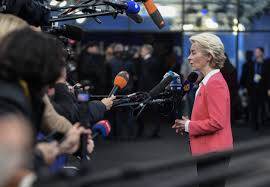Strengthening Security: The European Union's Commitment to a Safer Future
In recent years, security has become a cornerstone of European Union (EU) policy, with rising geopolitical tensions, economic instability, and the looming threat of terrorism reshaping the landscape of global security. The EU's approach to security is not just about defense but also encompasses a wide range of issues, including cyber threats, migration challenges, and economic vulnerabilities. With its diverse membership and varying national interests, security talks within the EU are complex but essential for a unified response to emerging challenges.
One of the most significant areas of focus in EU security discussions is defense cooperation. While the EU has no standing army, its member states participate in joint defense initiatives, such as the Common Security and Defence Policy (CSDP). This framework allows the EU to deploy military and civilian missions in conflict zones, provide disaster relief, and support peacekeeping operations. Over the years, the EU has increasingly recognized the need for stronger defense capabilities, and discussions around creating a more integrated defense force have gained momentum. The establishment of the European Defence Fund, which finances joint military research and development, is a step towards greater military autonomy within the union.
Equally crucial are the EU’s efforts to combat terrorism and organized crime. The EU has worked diligently to enhance intelligence-sharing, strengthen border control measures, and implement counterterrorism strategies. The European Counter Terrorism Centre (ECTC) plays a pivotal role in coordinating efforts across member states to tackle the growing threat of extremist violence. Furthermore, with the rise of cyber threats, the EU has focused on cybersecurity, establishing the European Cybersecurity Agency to protect critical infrastructure and promote cooperation among member states.
The security talks also address migration, a sensitive topic that has been at the forefront of European debates. With the ongoing migrant crisis, the EU has been forced to confront challenges related to border security, asylum policies, and humanitarian obligations. The EU aims to find a balance between securing its borders and upholding human rights, a delicate issue that continues to spark divisions among member states.
In conclusion, the security talks within the European Union represent a concerted effort to address the diverse and evolving threats faced by its member states. Through cooperation and shared responsibility, the EU is striving to create a safer and more secure environment for its citizens, while adapting to the rapidly changing global security landscape.



No comments yet
Be the first to share your thoughts!